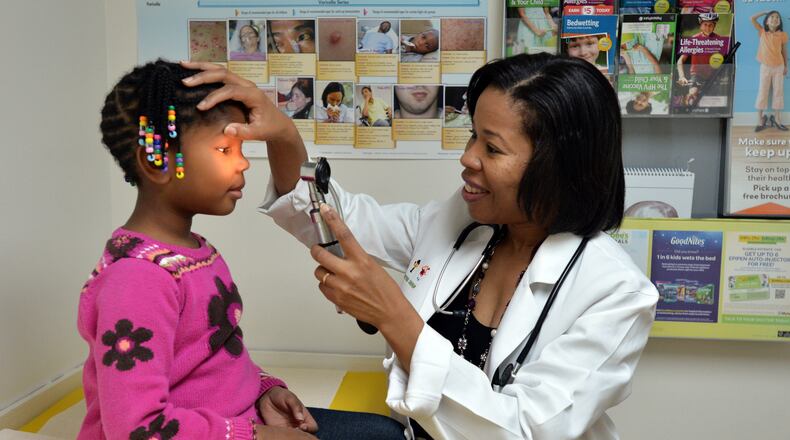With health care costs and the use of services going up and federal funding in some cases going down, the state agency that runs Medicaid is asking for a $268 million increase from the General Assembly next session.
The Department of Community Health board on Thursday approved spending requests for the midyear and next year’s budget for an agency that provides health care to 2 million Georgians.
If approved by lawmakers, state spending for the agency that runs Medicaid will have nearly doubled since the heart of the Great Recession.
That in spite of the fact that Georgia did not approve an expansion of Medicaid eligibility to more people, as many other states did, when the federal Affordable Care Act took effect.
Stacey Abrams, the Democratic nominee for governor, has made expanding Medicaid to more Georgians a key part of her platform. The federal government has promised to fund most of the expansion — at least initially — and supporters say the influx of money would help the economy and improve health care for hundreds of thousands of Georgians.
Republicans — including Gov. Nathan Deal — have said such an expansion would be too costly to the state in the long run, especially if federal funding turns out to not be a sure thing down the road.
Lisa Walker, the chief financial officer of the Department of Community Health, said several factors are driving up costs in the $3 billion health care agency.
Even with a strong economy, enrollment in Medicaid is going up. She said Georgians in the program are using more services. And she said spending on drugs is going up.
Norman Boyd, the chairman of the DCH board, said he was surprised to hear Medicaid enrollment is growing, considering Georgia's low unemployment rate. In July, the rate was at 3.9 percent, a 17-year low.
“You would think, I would think, the number of people on the low-income rolls would be going down,” Boyd said.
But the employment numbers probably have a limited impact on low-income Medicaid rolls because most recipients aren’t in the workforce, such as children and the disabled. Nondisabled adults without children are not eligible for Medicaid in Georgia.
Board member Mark Trail also said while joblessness has declined, wages haven’t necessarily risen for many Georgians. Because of that, some low-income parents may have jobs but still be poor enough to qualify for Medicaid.
While most of the increased costs in the DCH budget are due to Medicaid or things such as helping pay for indigent care at hospitals, the federal government is also playing a role.
The federal government is lowering the reimbursement rate to states for PeachCare for Kids, a health insurance program for children of families without coverage, officials said.
To make up the shortfall, the DCH is asking lawmakers to approve an additional $33 million for the program.
Programs such as Medicaid and PeachCare are heavily funded by the federal government. So, while the DCH’s state budget for fiscal 2020 — which begins July 1 — could top $3.5 billion, the total amount of taxpayer money being spent on public health care is more than $15 billion.
Ten years ago, the agency’s total spending, including state and federal funding, was about $10.7 billion. This year it’s budgeted to be $15.3 billion, and that figure will likely increase when the General Assembly approves a midyear spending plan in early 2019.
DCH officials said Thursday that they didn’t yet have a count of how much matching federal funding would be required in 2020 if their budget request is approved.
House Appropriations Chairman Terry England, R-Auburn, said increases in Medicaid are something legislative leaders expect every year.
He said 60 percent to 70 percent of babies born in Georgia are to families on Medicaid. About 1.3 million children get their health care through Medicaid or PeachCare in Georgia.
And then there is the annual inflation in medical bills.
“Even with record low unemployment, you still wind up with increased costs,” England said. “Medical care, period, is just getting more expensive every time you turn around, whether it’s an MRI that was $1,750 last year and $1,850 this year or something else.”
STATE OF GEORGIA COMMUNITY HEALTH SPENDING
Fiscal 2007 — $2.07 billion
Fiscal 2008 — $2.06 billion
Fiscal 2009 — $1.845 billion
Fiscal 2010 — $2.023 billion
Fiscal 2011 — $2.137 billion
Fiscal 2012 — $2.62 billion
Fiscal 2013 — $2.77 billion
Fiscal 2014 — $2.94 billion
Fiscal 2015 — $2.98 billion
Fiscal 2016 — $3.03 billion
Fiscal 2017 — $3.07 billion
Fiscal 2018 $3.08 billion
Fiscal 2019 — $3.39 billion*
Fiscal 2020 — $3.58 billion*
*If Department of Community Health budget proposals are approved
Source: Office of Planning and Budget, Department of Community Health
Stay on top of what’s happening in Georgia government and politics at ajc.com/politics.
About the Author
Keep Reading
The Latest
Featured





